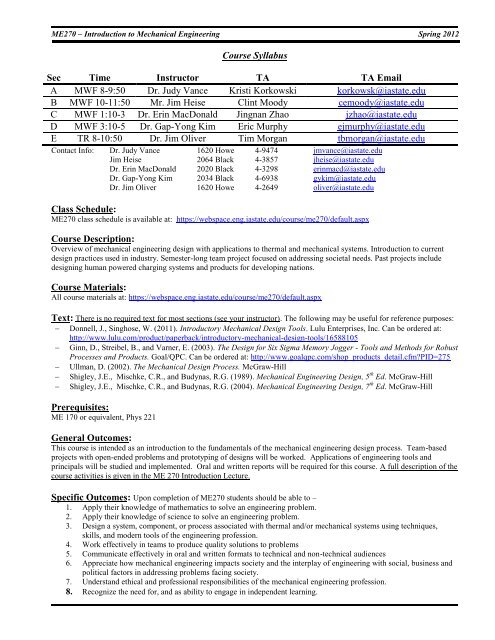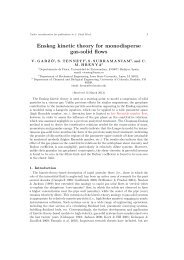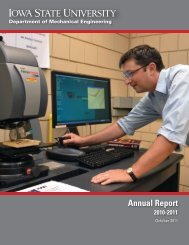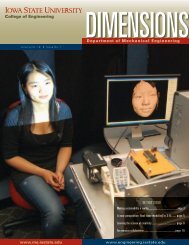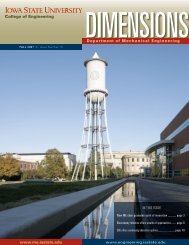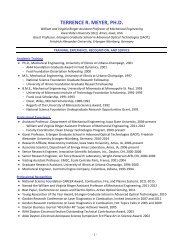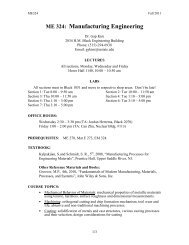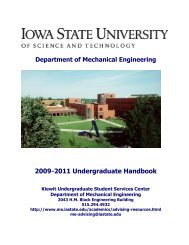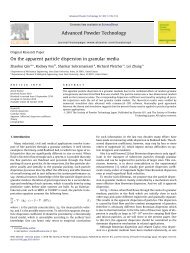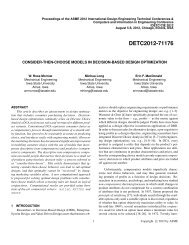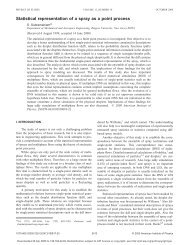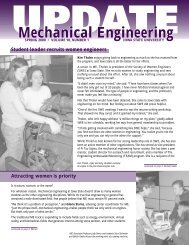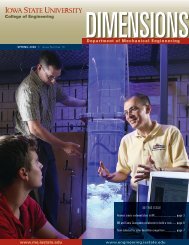ME 270-Introduction to Mechanical Engineering Design
ME 270-Introduction to Mechanical Engineering Design
ME 270-Introduction to Mechanical Engineering Design
You also want an ePaper? Increase the reach of your titles
YUMPU automatically turns print PDFs into web optimized ePapers that Google loves.
<strong>ME</strong><strong>270</strong> – <strong>Introduction</strong> <strong>to</strong> <strong>Mechanical</strong> <strong>Engineering</strong> Spring 2012<br />
Course Syllabus<br />
Sec Time Instruc<strong>to</strong>r TA TA Email<br />
A MWF 8-9:50 Dr. Judy Vance Kristi Korkowski korkowsk@iastate.edu<br />
B MWF 10-11:50 Mr. Jim Heise Clint Moody cemoody@iastate.edu<br />
C MWF 1:10-3 Dr. Erin MacDonald Jingnan Zhao jzhao@iastate.edu<br />
D MWF 3:10-5 Dr. Gap-Yong Kim Eric Murphy ejmurphy@iastate.edu<br />
E TR 8-10:50 Dr. Jim Oliver Tim Morgan tbmorgan@iastate.edu<br />
Contact Info: Dr. Judy Vance 1620 Howe 4-9474 jmvance@iastate.edu<br />
Jim Heise 2064 Black 4-3857 jheise@iastate.edu<br />
Dr. Erin MacDonald 2020 Black 4-3298 erinmacd@iastate.edu<br />
Dr. Gap-Yong Kim 2034 Black 4-6938 gykim@iastate.edu<br />
Dr. Jim Oliver 1620 Howe 4-2649 oliver@iastate.edu<br />
Class Schedule:<br />
<strong>ME</strong><strong>270</strong> class schedule is available at: https://webspace.eng.iastate.edu/course/me<strong>270</strong>/default.aspx<br />
Course Description:<br />
Overview of mechanical engineering design with applications <strong>to</strong> thermal and mechanical systems. <strong>Introduction</strong> <strong>to</strong> current<br />
design practices used in industry. Semester-long team project focused on addressing societal needs. Past projects include<br />
designing human powered charging systems and products for developing nations.<br />
Course Materials:<br />
All course materials at: https://webspace.eng.iastate.edu/course/me<strong>270</strong>/default.aspx<br />
Text: There is no required text for most sections (see your instruc<strong>to</strong>r). The following may be useful for reference purposes:<br />
� Donnell, J., Singhose, W. (2011). Introduc<strong>to</strong>ry <strong>Mechanical</strong> <strong>Design</strong> Tools. Lulu Enterprises, Inc. Can be ordered at:<br />
http://www.lulu.com/product/paperback/introduc<strong>to</strong>ry-mechanical-design-<strong>to</strong>ols/16588105<br />
� Ginn, D., Streibel, B., and Varner, E. (2003). The <strong>Design</strong> for Six Sigma Memory Jogger - Tools and Methods for Robust<br />
Processes and Products. Goal/QPC. Can be ordered at: http://www.goalqpc.com/shop_products_detail.cfm?PID=275<br />
� Ullman, D. (2002). The <strong>Mechanical</strong> <strong>Design</strong> Process. McGraw-Hill<br />
� Shigley, J.E., Mischke, C.R., and Budynas, R.G. (1989). <strong>Mechanical</strong> <strong>Engineering</strong> <strong>Design</strong>, 5 th Ed. McGraw-Hill<br />
� Shigley, J.E., Mischke, C.R., and Budynas, R.G. (2004). <strong>Mechanical</strong> <strong>Engineering</strong> <strong>Design</strong>, 7 th Ed. McGraw-Hill<br />
Prerequisites:<br />
<strong>ME</strong> 170 or equivalent, Phys 221<br />
General Outcomes:<br />
This course is intended as an introduction <strong>to</strong> the fundamentals of the mechanical engineering design process. Team-based<br />
projects with open-ended problems and pro<strong>to</strong>typing of designs will be worked. Applications of engineering <strong>to</strong>ols and<br />
principals will be studied and implemented. Oral and written reports will be required for this course. A full description of the<br />
course activities is given in the <strong>ME</strong> <strong>270</strong> <strong>Introduction</strong> Lecture.<br />
Specific Outcomes: Upon completion of <strong>ME</strong><strong>270</strong> students should be able <strong>to</strong> –<br />
1. Apply their knowledge of mathematics <strong>to</strong> solve an engineering problem.<br />
2. Apply their knowledge of science <strong>to</strong> solve an engineering problem.<br />
3. <strong>Design</strong> a system, component, or process associated with thermal and/or mechanical systems using techniques,<br />
skills, and modern <strong>to</strong>ols of the engineering profession.<br />
4. Work effectively in teams <strong>to</strong> produce quality solutions <strong>to</strong> problems<br />
5. Communicate effectively in oral and written formats <strong>to</strong> technical and non-technical audiences<br />
6. Appreciate how mechanical engineering impacts society and the interplay of engineering with social, business and<br />
political fac<strong>to</strong>rs in addressing problems facing society.<br />
7. Understand ethical and professional responsibilities of the mechanical engineering profession.<br />
8. Recognize the need for, and as ability <strong>to</strong> engage in independent learning.
<strong>ME</strong><strong>270</strong> – <strong>Introduction</strong> <strong>to</strong> <strong>Mechanical</strong> <strong>Engineering</strong> Spring 2012<br />
Course Guidelines:<br />
� Attendance is required for all lab periods. Attendance will be taken, and will be part of your grade.<br />
� The WebSpace will be used <strong>to</strong> distribute material for this class and serve as a reposi<strong>to</strong>ry for your work.<br />
� Expectations:<br />
o Come <strong>to</strong> class prepared and ready <strong>to</strong> work.<br />
o Complete assignments.<br />
o Ask questions when you don't understand.<br />
o Learn from your own work, from your classmates, and from the instruc<strong>to</strong>rs.<br />
o Be a reliable and cooperative member of your team.<br />
o Follow all rules on facility use. Keep team rooms and shop facilities clean and organized.<br />
� Grading:<br />
o The majority of your grade (71%) comes from team assignments, for which everyone in the team gets<br />
the same grade. It is your responsibility <strong>to</strong> contribute fully <strong>to</strong> the team’s work, and <strong>to</strong> make sure the<br />
work that the team hands in is up <strong>to</strong> your standards.<br />
o Late assignments will have 10% deducted for each day past the time due. Handing in at the end of lab<br />
when the due date is at the beginning of class will be considered one day late.<br />
o Assignments can be redone for partial credit if they are revised and returned by the next class period.<br />
o Participation is a significant portion of your grade. Your participation score is at your instruc<strong>to</strong>r’s<br />
discretion, <strong>to</strong> be based on your attendance in lab and lectures, participation in the lab, and contribution<br />
<strong>to</strong> your team’s project.<br />
Total Individual Team<br />
Due<br />
Date Assignment^<br />
1750 500 (29%) 1250 (71%)<br />
01. Inspiration Memo (3%) 50 50<br />
02. Project Charter (3%) 50 50<br />
03. Cus<strong>to</strong>mer Requirements, Market Analysis (3%) 50 50<br />
04. <strong>Engineering</strong> Specifications (3%) 50 50<br />
05. Concept Development (6%) 100 100<br />
06. Concept Proposal, <strong>Design</strong> Work Plan<br />
and Fast Pro<strong>to</strong>type<br />
(6%) 100 100<br />
07. Peer Review 1 (3%) 50 50<br />
08. DF<strong>ME</strong>A & Modeling (6%) 100 100<br />
09. BOM & Pro<strong>to</strong>type Cost (6%) 100 100<br />
10. <strong>Design</strong> Review (BOM, CAD, Fab. Plan) (11%) 200 200<br />
11. Testing Plan (3%) 50 50<br />
12. Peer Review 2 (6%) 100 100<br />
13. Final Pro<strong>to</strong>type (6%) 100 100<br />
14. Testing Analysis (6%) 100 100<br />
15. Expo Poster (3%) 50 50<br />
16. Final Presentation/Business Plan Report (11%) 200 200<br />
17. Peer Review 3 (6%) 100 100<br />
18. Participation (instruc<strong>to</strong>r assigned points) (11%) 200 200*<br />
^ Assignments for Section C (Dr. MacDonald) may differ slightly from syllabus<br />
* Participation points will be determined by a combination of attendance, participation in weekly status<br />
meetings and shop practices.<br />
� Special Needs:<br />
o Please speak <strong>to</strong> your instruc<strong>to</strong>r if you need an accommodation due <strong>to</strong> a documented disability.<br />
o Please contact the Disability Resources Office (515-294-7220, 1076 Student Services) <strong>to</strong><br />
coordinate your accommodation.<br />
More information can be found at: http://www.dso.iastate.edu/dr/


